With a duty to respond to every call made to the police department, police officers often find themselves stretched thin and they may struggle to juggle their time, and every officer fears they may attend one call only to miss another that results in a life-or-death situation.
At other times, if a call is not deemed urgent enough, officers won’t respond for a few hours until an officer is available. This is exactly why the Fort Worth Police Department in Texas has implemented an innovative Civilian Response Unit (CRU) to alleviate the stress of police officers throughout the city.
An innovative approach to promoting public safety
With Fort Worth police estimated to attend to over 50,000 non-violent calls a year, the CRU has been formed with the intent of police officers being able to focus more on emergency situations.
On March 15th, 2021, Fort Worth’s first graduated CRU assumed its duties. While the training was not as extensive as those who intend to enter the police force, the graduates spent six weeks training directly with the police academy, learning how to take fingerprints, fill out reports, and de-escalate tense situations. With these new skills, the CRU will deal with low-risk calls such as credit card fraud, traffic violations, and burglaries where the perpetrator is not expected to return. They will also handle administrative duties such as maintaining databases and documenting evidence.

While CRU members will be outfitted with a bulletproof vest, they will not be expected to face the same physical dangers that police officers do, and therefore will not carry weapons. The unit’s uniform is distinct from the wider police department, featuring a deep-red collared shirt emblazoned with the city logo on the arm.
Civilian helping keep the peace: an idea with historical precedent
The idea of the civilian tasked with keeping the peace is not new. Prior to the formation of official police forces, members of the public were expected to take matters into their own hands when the need arose.
In the 17th century London, upon hearing cries of ‘murderer’ or ‘thief’, it was not uncommon for every citizen to give chase to the suspect until their capture. Echoing this, the tradition of the ‘citizen’s arrest’ became popular, in which the government gave power to the people to lawfully detain individuals suspected of committing a crime.
The citizen’s arrest exists to this very day, although the relevant laws can be unclear and vary from state to state in the US. In California, for example, one must also be a witness to arrest someone over a misdemeanor. But if someone is suspected of committing a felony, then witnessing the event is not a necessity. When a person performs a citizen’s arrest, they may need to attend court to defend their actions and, if they are found to have acted incorrectly, they may face legal consequences for making a false arrest.
Public opinion divided
The Fort Worth CRU may be operated by civilians, but carries the full authority of the city. This has divided members of the public. Many are praising the idea, saying it will free up police officers’ time to attend to more urgent matters, while others are questioning the safety of those involved, worrying that members of the public will be putting themselves in danger.

In response to these concerns, new graduates and unit leaders have spoken out, insisting that they will be solely attending to situations that pose no immediate physical danger. Lt. Chris Gorrie, the officer supervising the project, hopes that the CRU will be successful and well-received by the community. And if the project is successful, perhaps we will see the dawn of a new era in which the public will work more collaboratively with law enforcement to keep our streets and communities safe, trusting in the commitment of all involved to uphold public safety.

